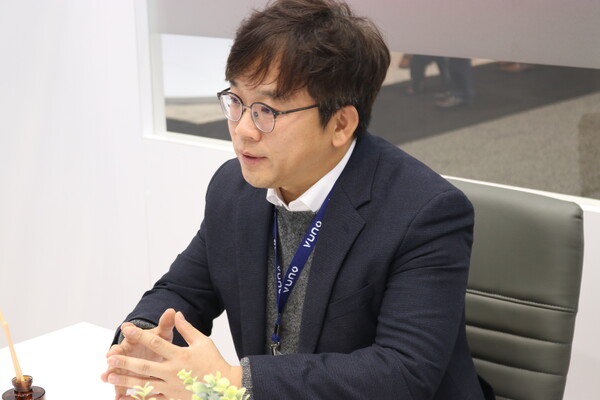CHICAGO, Ill. -- By Lee Han-soo/Korea Biomedical correspondent – VUNO, one of Korea’s leading players in the AI-backed medical device industry, anticipates breaking even in the third quarter of 2024 with a significant revenue surge attributed to its cardiac arrest prediction device, its CEO said.

The company provides solutions that analyze medical imaging data to assist medical professionals in diagnoses, and it also has a range of products that utilize various biometric data such as respiration, blood pressure, pulse, body temperature, and electrocardiograms (ECG).
While the company's sales were only 1.3 billion won ($1 million) in 2020, it has dramatically increased to 8.3 billion won in 2022.
In the second quarter of 2023, revenue reached 3 billion won, a fivefold increase compared to the same period last year. This surge in revenue was largely due to their cardiac arrest prediction medical device, VUNO Med-DeepCARS, which accounted for 63 percent of the total sales.
DeepCARS analyzes vital signs like blood pressure, pulse, respiration rate, and body temperature of hospitalized patients to predict the risk of cardiac arrest within 24 hours.
Considering that there are 3,600 cardiac arrest patients annually, with 75 percent of them leading to fatalities, early prediction by DeepCARS can potentially save many lives.
Last year, DeepCARS was recognized as an advanced medical technology and became the first AI medical device to enter the non-reimbursement domestic market.
In June, it was designated as an innovative medical device by the U.S. FDA.
On top of good domestic news, VUNO also obtained 510k clearance from the FDA for its AI-based brain quantification medical device, VUNO Med–DeepBrain, in October.
With this FDA certification, VUNO plans to leverage its U.S. subsidiary to strengthen sales and marketing efforts targeting local medical institutions, aiming for a swift entry into the market.
In this context, VUNO recently participated in the annual meeting of the Radiological Society of North America (RSNA 2023) for the eighth consecutive year. Korea Biomedical Review sat down with CEO Lee Ye-ha at the sidelines of the event in Chicago.
Having participated in RSNA for eight straight years, Lee reflected on the company's evolution from a small booth to a significant presence. He noted the growing prevalence of AI companies at the RSNA, highlighting how VUNO has marked its presence with consistent progress over the years.
"A notable milestone for VUNO this year was the FDA approval of our product, DeepBrain," Lee said. "This approval was particularly significant as it marked the first time one of our products received such recognition, paving the way for substantial revenue generation."
The company's overseas sales have also doubled this year, with expectations of continued exponential growth, he added.
Discussing the changing perceptions of AI at RSNA, Lee highlighted the establishment of an AI Pavilion as evidence of the medical community's growing acceptance of AI.
"I have observed a shift from a focus primarily on imaging equipment to a growing emphasis on software and AI companies during recent RSNA conferences," he said.
When asked about the uniqueness of Korean AI companies, Lee praised the conducive environment for medical AI development in Korea.
"This is thanks to the high medical standards and the concentration of major hospitals in Seoul, which facilitates collaboration with doctors," he said. "Domestic companies are gaining international recognition for their accuracy and quality in medical AI."
During the interview, Lee continuously presented his excitement about VUNO Med-DeepBrain, which recently received FDA approval.
"The software identifies and quantifies over 100 regions in the brain, assisting in the diagnosis of neurodegenerative diseases like Alzheimer's," he said. "Early detection has recently become more important than ever in the wake of new FDA-approved treatments for Alzheimer's and dementia."
Regarding the timeline for FDA approvals of other products, Lee mentioned the challenges and delays inherent in the process but remained optimistic.
"Notably, VUNO Med–DeepCARS's designation as a breakthrough device, which could expedite the approval process, hoping for approval within the next year," he said.
Lee also stressed that VUNO is working hard to address the recent hardship faced by the radiology field by emphasizing the potential of VUNO's products and platforms to alleviate burnout and reduce the workload for radiologists post-Covid-19.
"Studies such as those demonstrating the accuracy and time-saving benefits of our products, like VUNO Med-Lung CT AI and its positive impact in Japanese lung cancer screenings," he said. "This product received support for overseas clinical validation and advancement as part of the Innovative Medical Device Company Technology Commercialization Support Project by the Korea Health Industry Development Institute (KHIDI)."
Addressing the company's financial strategy, Lee spoke of the challenges in transitioning to profitability.
"With the potential revenue generation from products like VUNO Med–DeepCARS, I expect to reach a breakeven point possibly by the next year's third quarter," he said.
Commenting on the recent surge in medical AI stocks, Lee attributed it partly to the general public's heightened awareness of AI, thanks to developments like ChatGPT. However, he acknowledged the cyclical nature of investment sentiments in technology sectors.
"In the end, if we continue to demonstrate our services and show improvements in patient outcomes, the investment will naturally follow," Lee said. "Our main focus is undoubtedly on diligently advancing the products, such as Hativ (a medical grade ECG device) and DeepCARS."
Obtaining FDA approval and using this as a springboard for international expansion is the company's primary objective for next year, aiming for rapid growth, he added.
Related articles
- [RSNA 2023] Lunit's VP shares future of AI in radiology, discussing breakthroughs and challenges
- [RSNA 2023] Philips CEO Roy Jakobs leads turnaround after rough 2022
- [RSNA 2023] AI takes center stage at US radiology meet
- Korean medical AI imaging companies to showcase products at RSNA 2023
- [RSNA 2023] 'Philips can tackle radiologist burnout through AI, workflow optimization'
- VUNO to participate in Arab Health 2024
- VUNO's AI cardiac arrest prediction solution sets monthly record for new contracts, bed allocations
- VUNO presents ECG study at global AI conference

